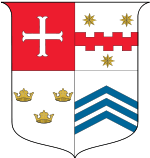Henry Bell Van Rensselaer
| Henry Bell Van Rensselaer | |
|---|---|
 | |
| Member of the U.S. House of Representatives from New York's 14th congressional district | |
|
In office March 4, 1841 – March 4, 1843 | |
| Preceded by | John Fine |
| Succeeded by | Charles Rogers |
| Personal details | |
| Born |
May 14, 1810 Albany, New York |
| Died |
March 23, 1864 (aged 53) Cincinnati, Ohio |
| Resting place | Grace Episcopal Churchyard, Jamaica, Queens, New York City, New York |
| Spouse(s) | Elizabeth Ray King |
| Parents |
Stephen Van Rensselaer III Cornelia Paterson |
| Military service | |
| Allegiance |
United States of America Union |
| Service/branch | Union Army |
| Years of service | 1831–1832, 1861–1864 |
| Rank | Colonel |
| Battles/wars | American Civil War |
Henry Bell Van Rensselaer (May 14, 1810 – March 23, 1864) was an officer in the Union Army during the American Civil War, and a politician who served in the United States Congress as a Representative from the state of New York.
Early life
Henry Van Rensselaer was born at the manor house in Albany, New York. He was the son of Stephen Van Rensselaer III (1764–1839), who was also a Representative and founder of the Rensselaer Polytechnic Institute and Cornelia Paterson,[1] the daughter of William Paterson, the 2nd Governor of New Jersey, and later, an Associate Justice of the Supreme Court of the United States.[2]
Henry graduated from the United States Military Academy at West Point, New York in 1831.[3]
Career
He was appointed a brevet Second Lieutenant of the Fifth Regiment, United States Infantry on July 1, 1831, and resigned January 27, 1832. He then engaged in agricultural pursuits near Ogdensburg, New York, and served as a military aide to Governor William H. Seward from 1839 to 1840.[3]
Van Rensselaer was elected as a Whig to the Twenty-seventh United States Congress, and served from March 4, 1841 to March 3, 1843. He was subsequently president of several mining companies. He was a director of the Northern Railroad (later the Rutland Railroad), but resigned to help found the Ogdensburg, Clayton and Rome Railroad.[4]
U.S. Civil War
Upon the outbreak of the American Civil War, he reentered the military service with the rank of colonel in the Union Army, and was appointed chief of staff to General Winfield Scott. He served as an inspector general of several corps and departments from March 1862 until his death.[3]
Personal life
Van Rensselaer's wife was Elizabeth Ray King, a granddaughter of Rufus King.
Van Rensselaer died in Cincinnati, Ohio. He was interred in the Grace Episcopal Churchyard, in Jamaica, Queens in New York City.
Descendants
Henry and Elizabeth were the great-grandparents of Floyd Crosby (father of David Crosby) and Jane Wyatt.
See also
References
- Notes
- ↑ Reynolds, Cuyler (1914). Genealogical and Family History of Southern New York, Volume 3. New York: Lewis Publishing Company. pp. 1166, 1341.
- ↑
 One or more of the preceding sentences incorporates text from a publication now in the public domain: Cabell, Isa Carrington (1889). "Van Rensselaer, Killian". In Wilson, James Grant; Fiske, John. Appletons' Cyclopædia of American Biography. New York: D. Appleton.
One or more of the preceding sentences incorporates text from a publication now in the public domain: Cabell, Isa Carrington (1889). "Van Rensselaer, Killian". In Wilson, James Grant; Fiske, John. Appletons' Cyclopædia of American Biography. New York: D. Appleton. - 1 2 3 "VAN RENSSELAER, Henry Bell - Biographical Information". bioguide.congress.gov. Biographical Directory of the United States Congress. Retrieved 31 October 2016.
- ↑ Susan Lyman (1976). Rails Into Racquetteville. The Norwood Historical Association.
- Sources
- United States Congress. "Henry Bell Van Rensselaer (id: V000052)". Biographical Directory of the United States Congress. Retrieved on 2008-11-21
- Service Profile
| United States House of Representatives | ||
|---|---|---|
| Preceded by John Fine |
Member of the U.S. House of Representatives from New York's 14th congressional district 1841–1843 |
Succeeded by Charles Rogers |
